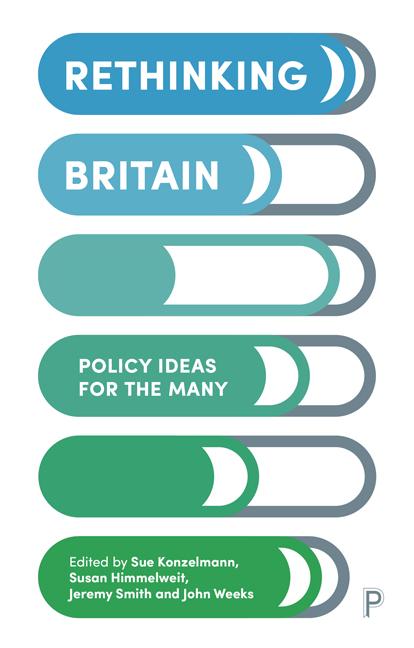Book contents
- Frontmatter
- Contents
- List of Tables and Figures
- The Contributors
- Foreword
- Introduction
- Interlude: ‘Mirror, Mirror, On the Wall – Who has the Highest Debt of All?’
- Part One Building a Full-Employment Economy: Introduction
- Part Two Public Investment – Prioritising Society Rather than Profit: Introduction
- Part Three Making Finance Work for Society: Introduction
- Part Four Genuine Social Security: Introduction
- Part Five How to provide for Social Needs: Introduction
- Conclusion
- Jargon Busters
- References and Further Reading
- Index
2 - What has the Market Done to the English NHS and with what Should we Replace it?
Published online by Cambridge University Press: 11 March 2021
- Frontmatter
- Contents
- List of Tables and Figures
- The Contributors
- Foreword
- Introduction
- Interlude: ‘Mirror, Mirror, On the Wall – Who has the Highest Debt of All?’
- Part One Building a Full-Employment Economy: Introduction
- Part Two Public Investment – Prioritising Society Rather than Profit: Introduction
- Part Three Making Finance Work for Society: Introduction
- Part Four Genuine Social Security: Introduction
- Part Five How to provide for Social Needs: Introduction
- Conclusion
- Jargon Busters
- References and Further Reading
- Index
Summary
What's the issue?
The introduction of market-like mechanisms into the English NHS since 1990 has failed to generate the benefits of enhanced efficiency, quality and accountability that market competition was supposed to deliver. As well as enabling fair access, an alternative hierarchical institutional structure for healthcare governance could improve accountability, allow efficient decision-making and reduce transaction costs.
Should we replace the existing NHS ‘quasi-market’ with a more hierarchical structure?
Analysis
The logic behind introducing market mechanisms into the NHS relies on the idea of a ‘perfect’ market, and how such an ideal type of market is meant to work. A market for a good or service is said to be perfect when competition is sufficient to ensure that the amount produced and the price at which it is purchased are ‘optimal’, in that the demand by well-informed purchasers prepared to pay that price can be satisfied by producers able to make a profit and therefore willing to sell at that price. Competition adjusts the market price until the demand expressed by purchasers is exactly met by the supply provided by the most efficient producers. Large numbers of both informed buyers and rational providers are required for competition to operate in this way.
In perfect markets, not only is efficiency assumed to be achieved: so is accountability. This is because each consumer is assumed to make their own decisions based on adequate information, providers are rational in making production decisions that maximise their profits, and the terms of the agreement between consumer and provider can be enforced by contract law.
However, such theories of perfect markets do not concern themselves with issues relating to fairness in the distribution of goods and services.
In contrast to markets, many public services are organised in hierarchies within which those at the top have most authority, with progressively less authority vested in each level below. Rather than purchasing services from the market, governments collect taxes and use these resources to produce and allocate services. One reason for this arrangement is that balancing the needs of different groups of people is important in the allocation of public services; hierarchies are required to make decisions on behalf of us all that take these different needs into account.
- Type
- Chapter
- Information
- Rethinking BritainPolicy Ideas for the Many, pp. 190 - 194Publisher: Bristol University PressPrint publication year: 2019



